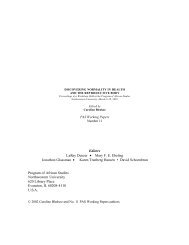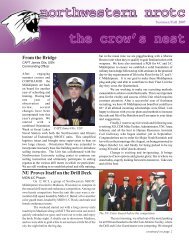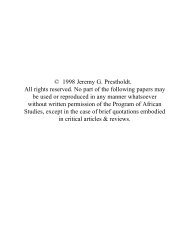TRAGIC RECOGNITION: ACTION AND IDENTITY IN ANTIGONE ...
TRAGIC RECOGNITION: ACTION AND IDENTITY IN ANTIGONE ...
TRAGIC RECOGNITION: ACTION AND IDENTITY IN ANTIGONE ...
Create successful ePaper yourself
Turn your PDF publications into a flip-book with our unique Google optimized e-Paper software.
What happens when Antigone and Creon attempt to ground their actions in their<br />
identities? Consider Antigone first. Her action exceeds and frustrates her identifications in two<br />
related ways: first, Antigone does more than she intends. Antigone frames her action as an<br />
expression of the pious devotion of sister to brother, and she underscores this identification<br />
through her refusal of the vocabulary of politics. Whenever Antigone is confronted with a claim<br />
about the city, she replies exclusively in the vocabulary of the family, refusing the possibility of<br />
any distinction between her brothers, even one more attenuated than Creon’s. As Martha<br />
Nussbaum puts it, “if one listened only to Antigone, one would not know that a war had taken<br />
place or that anything called ‘city’ was ever in danger.” 41 Despite her refusal of the vocabulary<br />
of politics, however, her expression of family piety turns out also to be an act of political<br />
subversion.<br />
However, Antigone does not merely turn out to have done more than she had intended,<br />
for her act places her into conflict not only with what she disavows but also with her own<br />
deepest commitments. Antigone’s relationship with Ismene is a telling example of this second<br />
kind of impropriety. Although Antigone is willing to suffer death out of loyalty to a blood-<br />
relative, in the pursuit of her goal she behaves toward her sister—her adelphê, born of the same<br />
womb just like Polyneices—with cold, vindictive hostility. When Ismene tries to warn Antigone<br />
that it is foolish to pursue her goal against the irresistible force of the polis, Antigone responds:<br />
“If that’s your saying, I shall hate you first, and next the dead will hate you in all justice”<br />
(93–94). And when Ismene shows her belated support for her sister by falsely declaring to<br />
Creon that she had been an accessory to the deed, Antigone declines the offer of solidarity,<br />
insisting that she “cannot love a friend whose love is words” (543)—and this comes mere<br />
14














